
Stories in this episode: Brothers Charlie and Sam start a trek up Mt. Kilimanjaro only to find that the steepest trail ahead lies in their conversations along the way; An important spiritual lesson on-stage leads Broadway performer Sandra to the surprising truth about her most challenging role off-stage.
Show Notes
Charlie Bird—the viral face of BYU during his years as Cosmo the Cougar—made waves across the nation when he came out and revealed to BYU fans that he is gay. Now, in Without the Mask, Bird reflects on how his identity has strengthened his testimony and how he views his sexual orientation in conjunction with his faith in Jesus Christ.
Alternating between memoir and teaching chapters, Bird's touching and authentic prose chronicles his decision to openly share that he is gay and to remain active in the faith. Highlighting the challenges Bird has faced along the way, the book also shares the blessings he's learned to recognize through his sexual orientation. Charlie feels deeply the importance of maintaining a relationship with God and hopes this message will "spark healing, bridge gaps of understanding and inspire hope" for other LGBTQ readers and those who love them.
References:
- "Act Well Thy Part" David O. McKay's Lifelong Motto
- "We Are Daughters of Our Heavenly Father," by Elaine S. Dalton, April 2013 General Conference
Photos of Sam and Charlie hiking Mt. Kilimanjaro with their dad and sister:
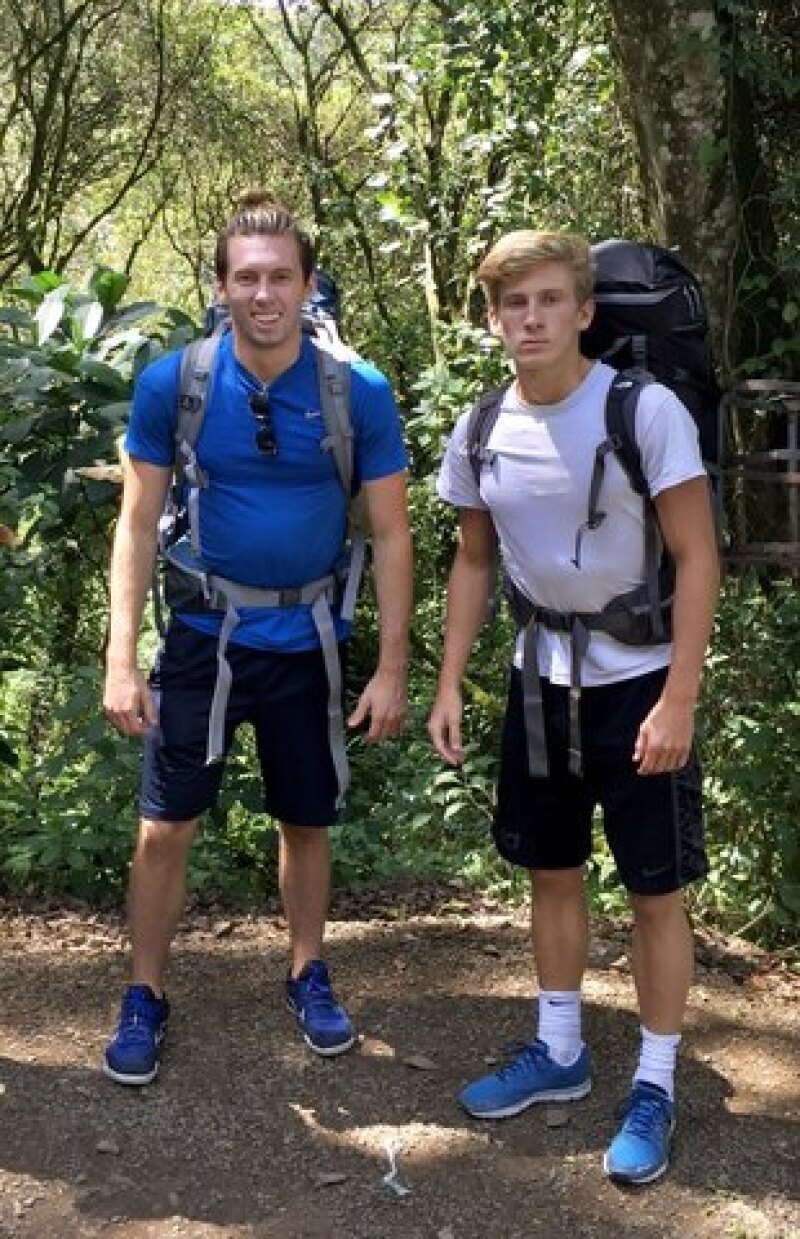
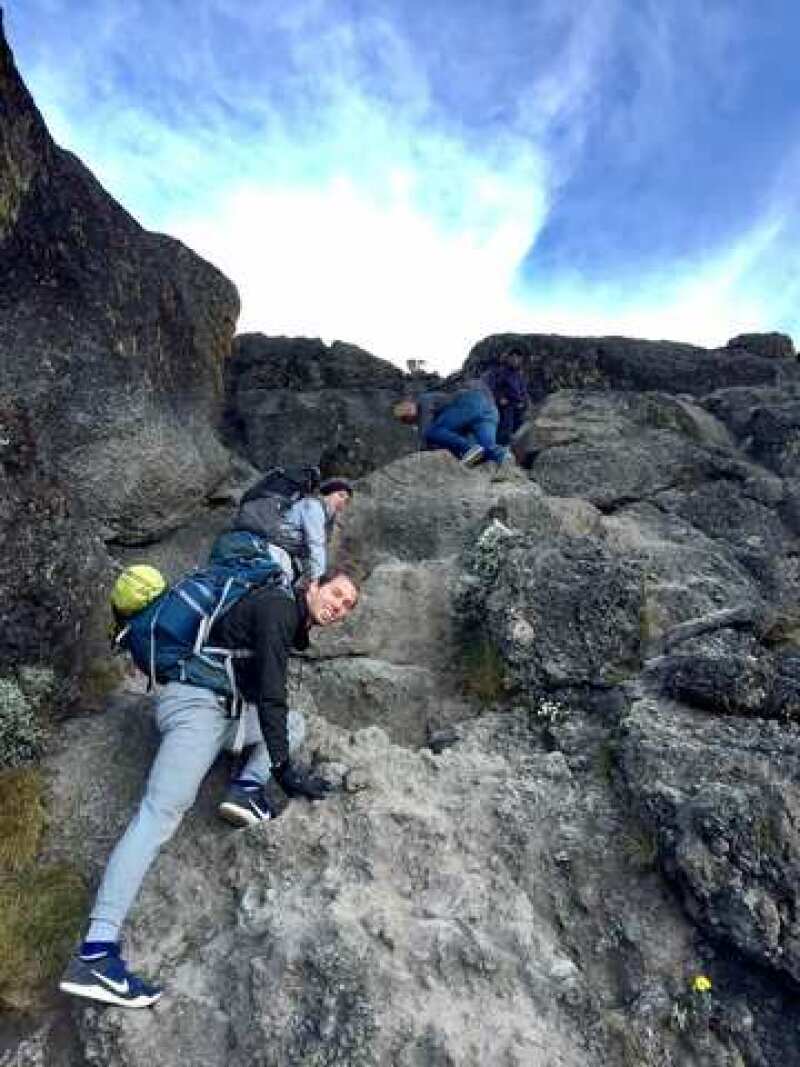
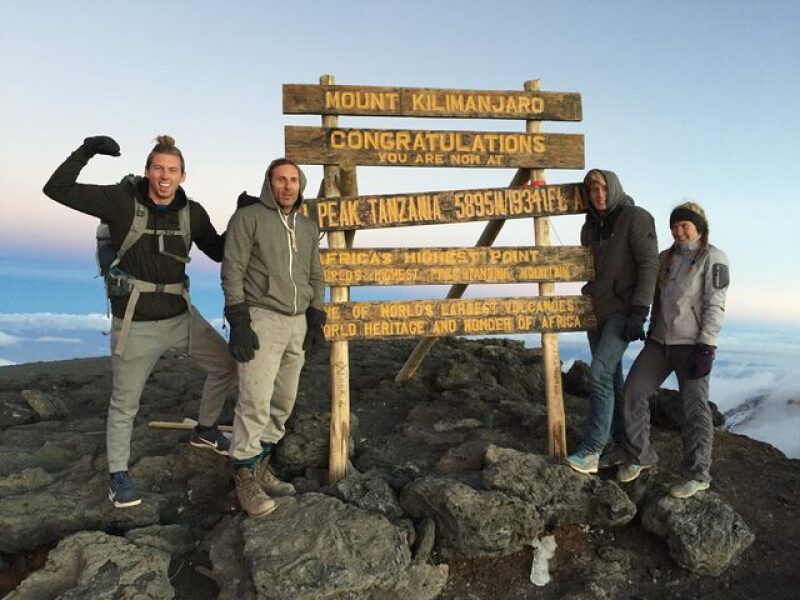
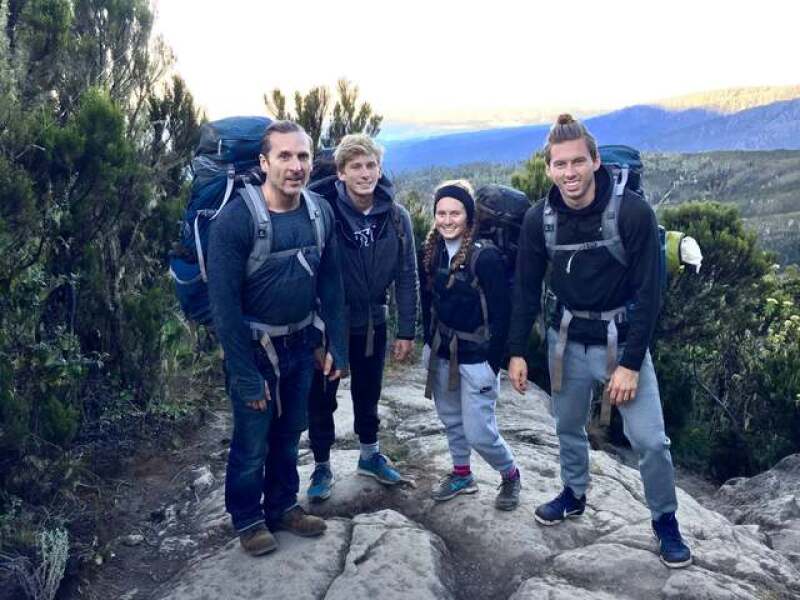
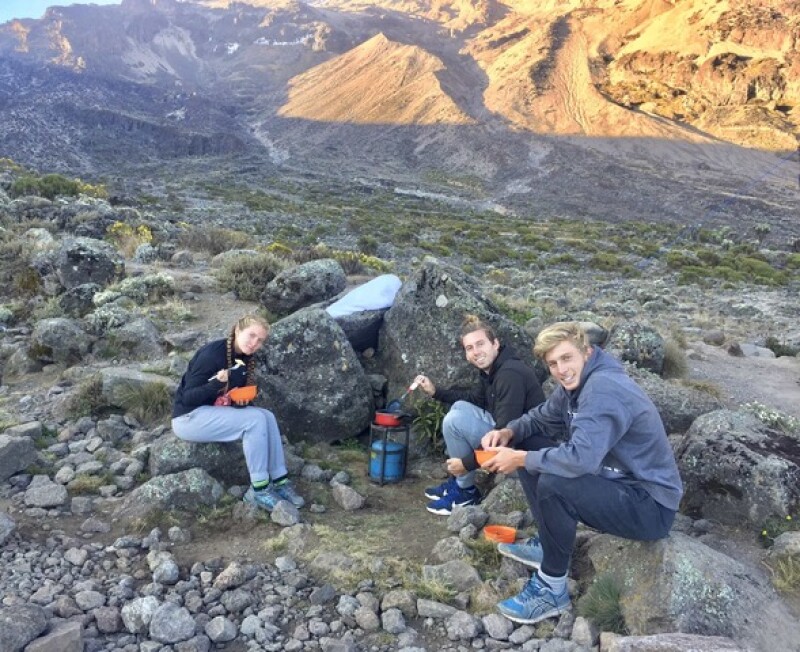
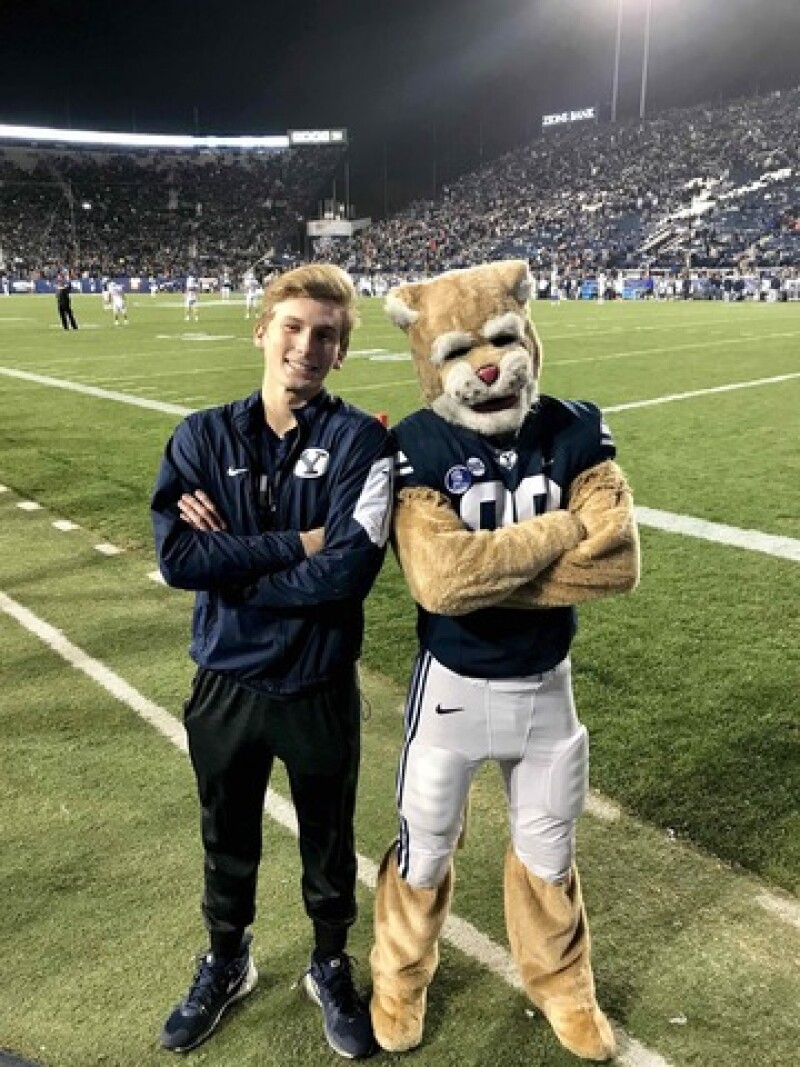
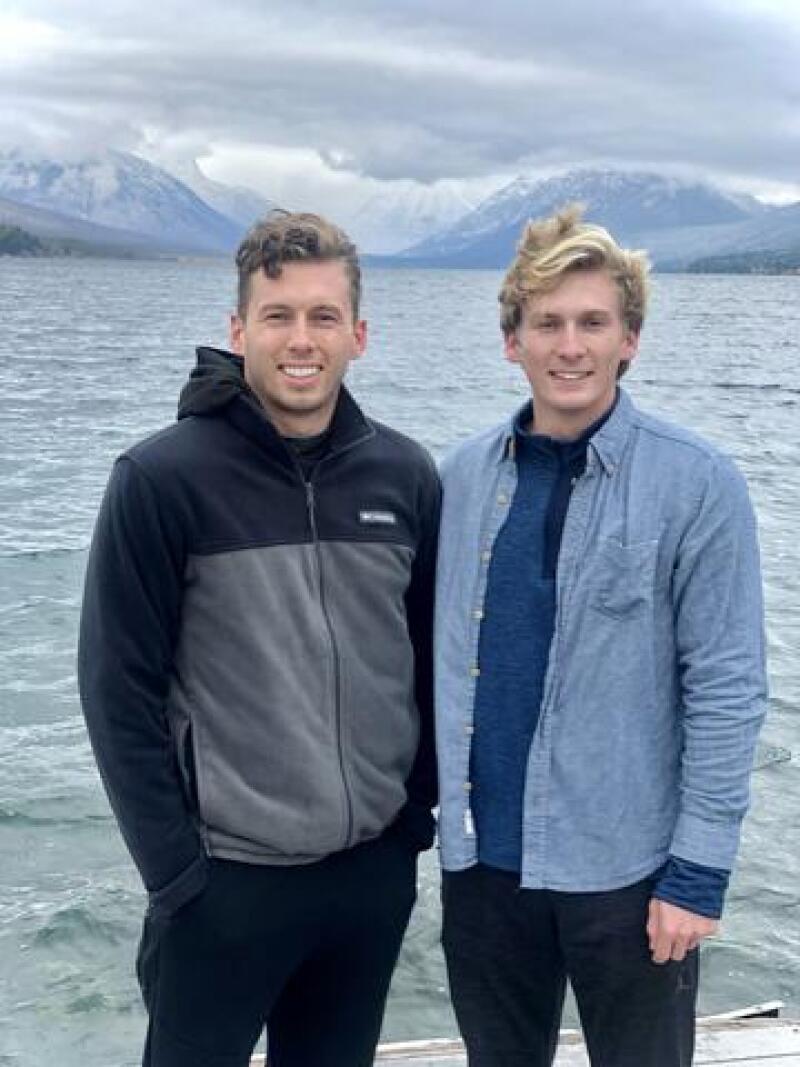
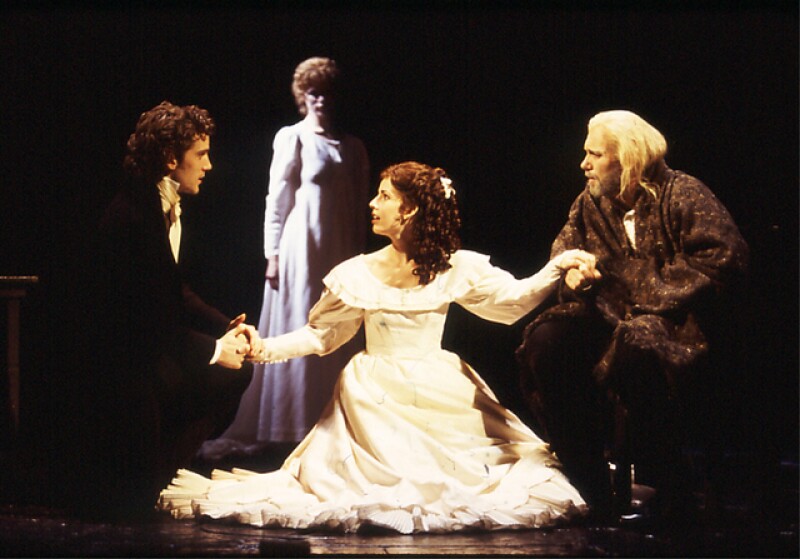
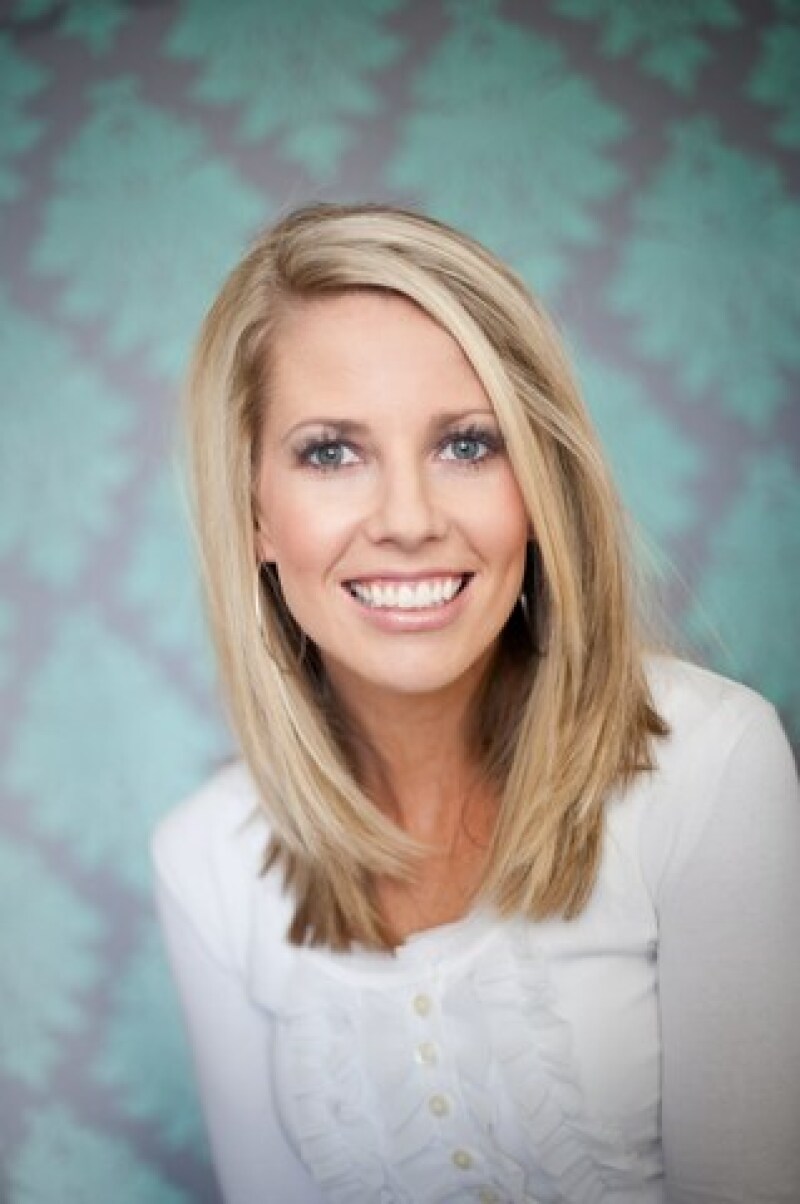
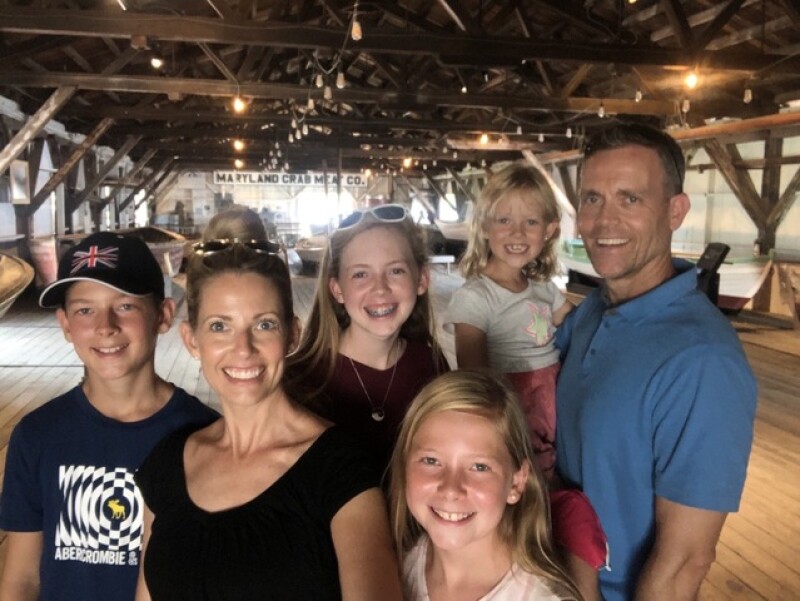
KaRyn 0:03
Welcome to “This Is the Gospel” an LDS Living podcast where we feature real stories from real people who are practicing and living their faith everyday. I'm your host KaRyn Lay.
Our theme today comes from an oft-repeated phrase, "What ere thou art, act well thy part," which has made its way into Latter-day Saint cultural consciousness in really interesting ways over the years, like its cousin, "I never said it would be easy, I only said it would be worth it," this phrase is often misattributed. Sometimes it's attributed to the scriptures, sometimes to Shakespeare, and sometimes to the Prophet David O McKay. But it's none of these things really. Nobody really knows where it came from. It was the life motto of President McKay, but that's because he first spotted the saying engraved on a stone in Scotland, where he was a discouraged missionary. The saying brought him comfort, and it helped him to buck up and jump back into the work of gathering Israel with his whole heart. And since then, he has shared it with all of us. And it has come to mean a lot of things to a lot of people in the Church of Jesus Christ of Latter-day Saints.
In fact, many years later, it became a touchstone for Sister Elaine Dalton's ministry, as the General President of the Young Women's organization. And if you are old enough to listen to conference in 2013, you might actually remember her very last talk before she was released. She talked about how this phrase sustained her during a time of deep discouragement. But why? What is it about acting well our part that captures our imagination and buoys us up in the face of disruption or challenge? Well, in today's episode, we have two stories from three people who found out what Shakespeare, or Shakespeare's brothers cousin, or whoever it was, who wrote that, what they already knew, when they carved that phrase into the rock. Our first story comes from two brothers who faced a steep mountain both literally and figuratively, and came down the other side with a clear sense of their part in the Gospel of Jesus Christ. We'll start with Charlie, and then you'll hear from Sam as the story develops. Here's Charlie and Sam.
Charlie Bird 2:08
So the first thing I remember thinking was, "Is this real life?" Because I'm looking at this mountain above me. And honestly, I couldn't really see much. It was just like a jungle with trees and vines, and it was just going higher and higher. And then it was just lost in the clouds. And I couldn't believe that I was actually at the base of Mount Kilimanjaro. If you know anything about my family, it's that we're kind of extreme and we love physical challenges. I'm there with my dad and my little brother, Sam, and my sister, Hannah. What we decided to do for this Kilimanjaro summit was try to do an unassisted hike. So most of the time, when you're hiking the mountain, you have like porters to carry your food and your water. But we wanted to go unassisted, which means we had everything with us just on our own backs. So I hoist this bag onto my shoulders, and I was like, "Oh my gosh." This is like the first moment that it's actually hitting me that I have to take this bag to the top of the tallest freestanding mountain in the world.
We go to weigh it in, and I can't remember exactly how many kilograms it was, but I did – it was like 30 kilograms, which is roughly 65 pounds. And I'm looking at my brother Sam, and we're like, "Are we cool? . . . Or are we crazy?" And looking back, I think it was a little bit of both. And honestly, all the park rangers there thought we were definitely crazy. For about two years before that I'd become a really avid hiker around Utah. And so I would do Timpanogos on the weekends with friends just for like fun and Angels Landing was a breeze and I was hiking all over the Wasatch Front and all over southern Utah. And I felt pretty good. But about 20 minutes into this hike – Kilimanjaro with 65 pounds on my back – I realized this was not going to be like any hike I'd ever done before.
One of the most incredible things that I noticed immediately was the environment, my surroundings. I've never seen so much foliage and animals, there was monkeys jumping through the trees, the landscape was just so beautiful. And there was these mossy vines that were hanging over this dirt path, the light was coming in, in like filtered scattered bursts illuminating the floor and there were flowers on the jungle floor. This is, this is the kind of trip that you know, everyone wants to go on but I was actually living it. I was like, "I cannot believe I'm doing this." And even better, with some of the people who I loved the most.
A couple hours into the start of our hike, we're just climbing. Elevation is steep and me and my little brother Sam are just moving out. For some reason. We were just feeling good. I think we were just excited to be there. We kind of got ahead of the rest of the pack. And for a while it was just me and Sam on the trail. And it was so interesting to look over at him. And notice that, you know, he'd always been my little brother. He's five and a half years younger. It was always kind of like – he was just little, you know? But now I'm looking at him and he's the same height as me and our strides are matching and I was like, "Dang, my little brother's like – a man." You know, I'm protective of him. I've always been like a caretaker of sorts to him, but now he was an equal and that that was kind of the moment I realized that he was an equal as we're moving out on this trail.
Sam Bird 5:18
Charlie and I had always been close. He had always been my best friend, my older brother, five years older than me. So I've always looked up to him, really in everything. Just the way he's been able to interact with people. He – we always said that Charlie is so skilled and talented in so many different fields that, that he could literally do anything. And I wanted to be like that. And he coached me through a lot of things and taught me a lot of things. And I was just happy to be with him.
Charlie Bird 5:46
You know, sometimes I wish there was a word that conveyed something stronger than brother, because that's how I've always felt with Sam. Growing up, we shared a room, and we basically shared everything. We played basketball – he's a basketball star – I honestly can't remember a single time I've ever lost a pickup game at the Rec Center, when Sam's on your team, like you want Sam on your team. And we just loved adventure. And we would explore and we would sing together and try to cook together and stay up late every night talking just about our lives and what we wanted to do and our big dreams. And then now as adults, we share the same clothes and we bought the same type of car. And just everything we did, we were we were essentially like twins.
And so sometimes using the word "Brother" to describe Sam doesn't seem like it's full enough – that it's meaningful enough, because our relationship was just, was just so deep. But there was one really important part of me that Sam didn't know anything about. And as we're walking up this mountain, and I realize that he's no longer just a little brother, that he's my equal, I'm realizing that I was hiding something really important from him. The fact that I'm gay.
At this point in time, I was putting so much emotional and mental and spiritual energy into trying to figure myself out and figure out how to reconcile my faith with my orientation. And so much of my life was devoted to that. And he didn't know anything about that. And I felt that – it almost felt like a physical barrier to our relationship. I get asked quite often, "Why do you have to come out? Like, straight people don't have to come out." And in a way, I think that's kind of the point, like, the assumption is that everyone is straight. And so everyone – at this point in time – was assuming that I was straight. And to be completely honest, for a little bit, I liked that. Because for a long time, I wanted to be straight, so bad, I really wanted to fit in. And so when people assumed I was straight, I felt like I didn't have to work so hard to prove my worth. And the paranoia of someone thinking that I was gay, would go away.
But as I became more accepting of myself, and as I started praying about the nature of my orientation, and feeling like I needed to accept it and stop trying to change, everyone else thinking I was straight got really awkward. Because – because I'm gay. And people were like, either always trying to set me up on dates with girls, or talking about my future wife and my future family. And I just felt so weird about it. And especially with Sam. I mean, we're brothers. So like, we talk about girls. And like, that was a big part of our relationship. And it was a part that I had faked my entire life. I just felt so insincere and, and awkward hiding this part of me. So there I am, on what I consider to be like one of the most exciting, beautiful, like vacation, trip, adventures of my life, and now we're three hours into the hike and I'm having this existential crisis. Because I'm like, "Sam doesn't know I'm gay. And no one knows I'm gay." Well, actually, at that point, my sisters and my cousin knew and that was it. And I was like, "I'm living a lie."
And I was trying – really what I was trying to do was just like, be mindful and be in the moment. So instead of like focusing on all of this, like anxiousness and worry, I just start thinking about the trees. Like, "I'm going to focus so much on the beauty of this landscape, that it's just going to push this out, and I can shelf it until I can figure out what to do with it." And so I'm looking at the trees and, and I'm, I'm an artistic soul, and I have a real soft spot for nature and for beauty and for beautiful things. So I'm just trying to focus all of that energy into that side of my personality so I can forget about that I can't tell Sam I'm gay.
And the reason I felt like I couldn't tell him is because I cared about him so much. And I was so, so terrified of any potential rejection. I mean, this is, this is my brother, like, he's an extension of me and, and his role in my life is paramount. And the thought of changing that relationship, or making it weird or divisive, or polarizing or just even different, filled me with such incredible fear. It was crippling. And, you know, on top of that, I'd always kind of been his mentor, you know. I, I was the older brother, he would come to me for advice and with questions, especially spiritual questions. And I – this recurring thought I keep having was, "Is he still gonna trust me if he knows I'm gay? And how am I supposed to teach him anything about life or religion or faith? When I myself am incredibly confused? like, how is he going to trust me?" The weight of that potential rejection was so heavy, and it weighed so heavy on my soul, like it was heavier than my backpack, which by the way, was incredibly heavy, if I can remind everyone it was 65 pounds. I just, I didn't know what to do.
As we're walking, we're sweating. We're breathing heavy. And it's been probably 35 – 45 minutes, where I'm just focusing on the trees, you know? And he's like, "What are you thinking about?" And I was like, "Uh oh, he caught me off guard. I wasn't expecting it." So I just kind of went along with what I was trying to do, which looking back, it was silly, but I was like, "Oh, you know, just like the trees." And so I start describing what I was trying to see in the trees. And, and you know, which is true, like, my goodness, they were beautiful. But I'm trying too hard.
Sam Bird 11:59
Everything was normal. And then all of a sudden, Charlie started talking about the trees, but like, in a really weird way. I know, Charlie, and I know he loves trees, right? And I know Charlie always loves to talk about like, the elements and everything working in sync, and blah, blah, blah. But at this point, I'm like, "Alright, Bro, I get it. The trees are nice." It's like, this is 45 minutes of us talking about trees right now. So I'm done. I'm like, "Okay, what is actually going on?"
Charlie Bird 12:29
And he's like, "Dude, like, why are you being weird? What's actually up? Because I can tell there's something up." And I got the coming out feeling. So, it's funny, people ask me a lot like, "What does it feel like to come out?" And I think coming out is one of the most courageous things anyone can do. Because it's scary, you know, like that potential rejection is a really hard thing to face, especially with someone you care about. And I compare the coming out feeling to the way someone might feel if they had to speak unprepared in front of a group of like, 100,000 people. Or, in fact, the closest thing I've ever got to it is the feeling of when the spirits telling you that you need to bear your testimony on a fast Sunday, but magnified by like, some exponential amount, because it's just so – like, it's like this release that has to happen, and you know, you have to do it. But no part of you wants to stand up and walk to the pulpit. And you're not sure that your legs will support you or you don't know if you're going to pass out or throw up.
So here I am taking that walk to the pulpit, as I'm about to speak and tell my brother that I'm gay. And I started hyperventilating. Which, it's so funny because like, I'm an athlete, and I am a gymnast, and I'm always so in control of my body and my body's reactions to things. And I started breathing so heavy and I was like, like verging on a panic attack hyperventilating, I was so nervous to tell him. And he – I remember he made this joke, he was like, "Well, for being the world's greatest mascot, you're sure not in very good shape." And he's like, taunting me because he's like, "Haha, I'm in better shape than you." And then I was like, I actually couldn't breathe. And so I got it out, I muttered out, "It's not the mountain," Between like – honestly it was like "It's . . . not. . . the. . .mountain." And I remember his face changed, like his, his brows knit together, and he got really concerned and he was like, "Oh, like, are you okay?" And he's like, afraid I'm actually going to pass out because I probably was about to. And he was like, "Hey, there's a fallen log right over there. Give me your bag, I'll take it over there and we can rest for a while and get get some food. I have a Snickers bar, you should eat it." And I'm watching my brother just have so much love for me. I was like I have to tell him. He says "If it's not the mountain, what is it?" I said "Sam," and I waited for a while. I said, "I'm gay. He said, " . . . what?" And I said, "I'm not attracted to girls." Like I kind of defined it for him. I wanted him to understand what I was saying. I said, "I'm gay, Sam. I'm attracted to guys."
Sam Bird 15:23
At first, I thought it might have been a joke. Because I was confused. I thought Charlie was straight, totally 100% straight. So I was kind of trying to figure out how he could be gay. Because in my mind, it wasn't an option. My mind directed to just, "Okay, then what about this girlfriend? Or what about whenever you told me this or that?"
Charlie Bird 15:47
And honestly, at this point, I still wasn't sure how this conversation was going. I was like, "Is this a successful coming out or not? Because we haven't really gotten anywhere." And he was just confused.
Sam Bird 15:58
And I started asking him questions, and I asked him, I was like, "Isn't it a choice to be gay? Like, why'd you choose this?" I remember him telling me "Why would I choose this? You don't think – " and he went off on like a rant, and it was emotional. He said, "You don't think I want to get married in the temples Sam? You don't think I want all these things – that we all want?" The blow that hit me the hardest was whenever he said that he went on a mission – he served a mission, hoping that if he served well, and if he served perfectly as he said, God would take his "gayness" away from him. And that's when it really clicked for me, that he didn't choose it. Being gay is not a choice. There's so much more than what meets the eye.
And I felt horrible. I felt horrible, because I had said a lot of things very, like derogatory things about gay people. So I apologized for all the things I told him, all the things I'd said, just all my misconceptions. It was tough. I still didn't really know what to do. So I said, "But what are you gonna do? Cause I don't know what to do so like, what are you gonna do?" And when I asked him what he was gonna do, I meant it in a way of like – a futuristic way, as in like, "Okay, what are you gonna do with your life and with everything that we've been taught, and everything that we know, inside the church, even outside the church, like social norms?" So the question I asked was probably kind of a tough question to answer. And it was, and he just said, "I don't know. I don't know what I'm gonna do." And whenever someone you love, so much, doesn't know what to do. I think in any circumstance, it's hard. And so I just told him like, "Bro, I don't care what you do. Like, I'm gonna be here for you, I love you. You're my older brother. We're tight. We're, we're cut from the same cloth, nothing will change. Nothing will change between our relationship." It was an emotional moment, like we embraced. We started crying.
Charlie Bird 18:07
He explained to me that, like he had so much faith and love for me. And that whatever I chose, he knew would be the right thing for me, and that he would support me no matter what. And at this point, I'm speechless. Because I don't think there could have been possibly a better reaction. I'm coming to him with this this huge, weight. Something I was so nervous to tell him. And he said, "I love you. And I trust you." And those were my two biggest fears – that his love for me would change, and that he wouldn't trust me. And I know he was inspired to say that.
Sam Bird 18:49
So we sat on this log, we shared a Snickers bar and we just talked. And I told him I'm sorry. That's mostly what happened – was me just apologizing. Maybe for 30 minutes. I just told him I was sorry. He, you know, he forgave me really quickly said, "It's okay. You didn't know, you didn't know." But I still felt bad. I'm like, "Yeah, but . . . " The worst part was that he couldn't trust me to tell me before, when it was harder. And that's important. I'm glad he came out to me whenever he felt like he was comfortable to, but I wished I could have done something before to make him feel comfortable.
Charlie Bird 19:27
So about 20 minutes later, we're sitting on that same mossy log, and my dad and my little sister and the trail guide came up and caught up to us. Honestly, they were kind of mad. They were like, "Where have you been?" And we're like, lost in Africa, you know? And we're like, "Oh, we were just feeling it." And it was just so funny to know that me and Sam were the only ones who knew that we just had this incredible spiritual bonding experience. And my dad and my sister Hannah are like, "You're so annoying. You think like, what are you trying to prove?" And we were joking with them and we're like, "Dad, you're just, you're just mad because we're so much faster than you, you old man." And you know, Sam's words were still ringing in my head when he said, "This doesn't change anything." And I was like, "Oh my gosh, nothing changed. This feels normal." But at the same time, everything changed, because now all this weight that I was carrying up this mountain emotionally, is gone. And now we can just focus on the physical weight. How great is that? Like, that's the reason I'm here in the first place. I love a physical challenge.
And the rest of the mountain, we just hiked it with this vibrance, and this tenacity. We descended through these beautiful valleys and we walked through these fields of broken obsidian. And I was just feeling so good. And I'm kind of a peacock, and I like to show off. And so a couple of times, we'd catch up to hikers that had been doing it for days. And we – we'd you know been, we'd been skipping campsites because we just felt so good. All four of us. And I would take off my bag and I'd be like, "Hey, Dad, take a picture of me doing a backflip." Just so all the hikers could watch me do a backflip on this ledge. This I mean, like ledges that look over the earth, the whole world just fields of endless clouds.
And at night, it was so cold, the sun would go down, it was just freezing. And me and Sam were sharing a little two person tent. So we would just like get as close as possible and try to sleep. But we didn't have mattress pads or anything because it was so minimalist. You know, we took only like bare necessities. And so these rocks are cutting into our ribs and we can't sleep. So we just talked. And I was honest with him. And I noticed that as I was vulnerable and opened up, he was sharing things with me, too. Things that he'd been struggling with or dealing with or trying to figure out that he'd never really felt able to, to bring to the surface. And the love we had for each other was like gilded in a way. Because we just got so much closer.
On the morning of the fourth day – maybe it was the third day – it wasn't very many days, that's all I know, it's kind of all a blur. But we woke up at two in the morning. And after we'd been at base camp and we took the the final summit to the top of the mountain, the four of us together and it was cold and it was windy and like probably 1000 times I wanted to stop and turn back because it was just so cold. But there was no way we were going to risk missing sunrise at the top of this mountain after we worked so hard to get there. And we're waiting up there, it's it was negative three degrees Celsius. I'm not sure the conversion for that, I'm only good at kilograms. But uh, we're waiting up there shivering next to each other. And we watched the sunrise from the summit of the tallest freestanding mountain in the world. And it illuminated the glaciers and it casts beautiful pink and blue hues. And it was one of the – if not the most magical moment of my life. And I got to share it with the people I love the most.
This Kilimanjaro trip, we talk about it so much for so many reasons. You know, we got up and down in four and a half days, which was unprecedented. Honestly, we got down so fast, because we ran out of food and we were just starving. So from the summit, we just went all the way back down and just did like, I don't know, like 16 to 20 hours of like straight hiking on the way down. And in this trip for Sam and, Hannah and my dad and me, it's become like, almost a legend, you know, some sort of fable that we just love to recount and tell stories. And, "Remember when we did this . . . " and it just, we just really loved this trip. But out of everything that happened for me, and I think for Sam too, the most beautiful thing was that moment where where I came out to him. And he met me in such a wonderful, perfect way for the situation.
Sam Bird 24:03
I never really knew how important the Kilimanjaro trip was to Charlie until he published the book, until he published Without the Mask. And I'm just happy that we're so much closer now. Like now I can tell Charlie anything. And he'd love me anyway. And vice versa. He could tell me anything, and I'd love him anyway. And so we know that. And that trust that we've developed in large part because he came out to me has absolutely strengthened our relationship.
Charlie Bird 24:37
For a really long time I was acting a part that was never my part to act. It was a role. It was it was fake. But when he saw me for who I am, it helped me connect with who I am. And it solidified all the real parts of our relationship. And it kind of made all of that fakeness and that triviality – was gone. It just felt so much more real.
Sam Bird 25:03
He was made for this. I think, I think that he was made to be a leader in this, like this movement of just equality and seeing everyone as Christ would see them. So even a hater who DM's him on Instagram, he tries to see them as Christ would see them, Because that's what he hopes from them, which I've, I couldn't do it, I couldn't do it. I would want to throw hands, I would want to find somebody, I would want to say, "Don't you call my brother that! I'll. . . Ahh!!" But he just responds every time, "Sam, I will not fight hate with hate." The perspective shifts that has been that he has instilled in me has been monumental just for my ability to see people the way God sees them, and the way I should see them. And the way someone should treat someone.
To act well my part, I first need to know my part. And I think that if each person did that we could create change within our families, our communities. And that's why I'm so proud of Charlie, because within our family and our community, it has happened. And the difference has meant everything – I know it's meant everything to him, and because it has meant everything to him, it means everything to me.
Charlie Bird 26:22
When I think about the way that Sam interacted with me, in that moment, one of my most vulnerable, courageous moments, I can't help but think that that's exactly how the Savior would have acted. I believe that he would have shown love, and that he would have shown trust, and that he would have been able to do that same thing and read who I am and what I needed. And it was so beautiful to see the Savior – my Savior – Jesus Christ, emulated in my brother. And I feel like I've learned a lot about how to be Christlike, and how to actually love a human, because of the way that Sam was able to act well his part.
KaRyn 27:17
That was Sam and Charlie Bird. You may recognize Charlie's name from the years that he was celebrated as the BYU mascot Cosmo. And as Sam mentioned, Charlie wrote a book about his time as Cosmo and what it was like to come out to the world in such a public way, and why it was so important to his faith that he do it. The book is called Without the Mask: Coming out and coming into God's light. And that's where we first found the story. But like any good story, there was so much more to it. And we were really happy to be able to share both Charlie and Sam's experiences, I can feel the love that they have for one another, and even more than that I can feel the love that they have for Christ. And that love is what fuels their desire to follow him in whatever role they are asked to play.
In this story, in this moment in time, playing their part will looked different for each of them. For Charlie, stepping into his role meant bringing honesty and vulnerability and a willingness to trust his spiritual promptings to the stage. But for Sam playing it well looked like listening, offering generosity of heart and apologizing. Their roles, their part in the play of life will most likely be reversed at some point. I mean, that's true for all of us. We never step into the same stream twice. But if like Sam and Charlie, we lean into the attributes of Christ that we are so desperately trying to take on ourselves, we'll be able to show up for whatever role is next in our life with confidence. And our final story comes from Sandra, whose time on a big fancy stage prepared her well for a season of life with very little to no fanfare. Here's Sandra.
Sandra Turley 28:59
Our youngest daughter is absolute sweet and sour. She is sickeningly sweet, sometimes, actually, most of the time she's sickeningly sweet, where I feel like there's nobody more angelic than she. There just is not. The cuddles and the loves and the squeezes and the love notes are overwhelmingly loving and gorgeous. And then she comes out with these shockingly sour moments where she's just screaming because she's the youngest of four, and we have trained her to think she's the queen of the world, and that she should get everything that she wants at the moment she wants it.
So a few weeks ago, I was asking her for the millionth time – okay, fine, to be fair, probably the 14th time – to sit down and just finish her lunch. Just finish the lunch. It's been sitting there for an hour, please just finish her lunch. I leave the room I come back in, she's nowhere to be found. In fact, she's outside jumping on the trampoline. So I go outside, try to stay calm, bring her inside, and she knows what's gonna happen, because this is not a one time occurrence. We come inside and I put away her lunch and I take her upstairs and I say, "I'm sorry, you missed lunchtime, time to go take a break." And she starts kicking and screaming that she's starving, and what am I doing to her? If I don't let her eat lunch, she's probably gonna die. She's telling as she's screaming this. And so while she's screaming, I start screaming, "I can't do this anymore! You never listen to me. You really, you have to stop screaming. Right now!" Is what I'm yelling to her. "Please stop screaming" is what I'm yelling, ah. And here is the moment that I find I'm in constantly.
This is a repeat performance for the two of us. And I see a pattern that I am desperately trying to break. The pattern is, I get triggered by a single moment, then I have one initial thought from that moment. And shortly it turns into an avalanche of self loathing, where I completely closed myself off to everything else and figure that I'm the worst person in the world. Meaning in this instance, my first thought, as I shut the door and left her screaming in her room was, "You, Sandra, are so horrible for yelling at her." And then that one thought avalanches into all of these horrible thoughts that I'm a horrible mom, I need to control my temper, "Why can't you just let her be seven? She's going to be scarred for life. You haven't taught her right, it's your fault, not hers, you're never going to get better at this." And then the worst thought of that avalanche becomes, "This is because of your voice." My voice that God gave me, that I have used as a singer and a performer on stage. I've used it to actually bless thousands of people's lives in ways that I could share somewhat of His spirit, is also the same voice that I just used to crush my little daughter's heart.
So in 2003, I was performing on Broadway in Les Miserables. I was performing the role of Cosette, the daughter of Jean Valjean, the main character. And the whole story is just gorgeous. The whole story is about this man, Jean Valjean his redemption in life and each night, as I was performing in the show, adding my voice to the voices of all the other characters on stage, I was not amiss to the fact that we were sharing the concepts of mercy, and justice and sacrifice and charity. And I heard at the end of every single show, as my character Cosette was down at the very front of the stage, I could hear the sound that was my favorite to hear, which was the passing of the tissue packages from audience member to audience member and the sniffles. Because to me that small little sound meant that lives were being changed. hearts were being touched. Maybe they were thinking, "I should have more mercy or for that person in my life, or maybe for myself." So there's no doubt in my mind that God was in the work that I was doing on stage. No doubt at all. God's spirit was there. Whatever anybody else wanted to call it. I called it the Spirit, the Holy Ghost. That's what I was feeling every night.
I also felt that just as much offstage as I did onstage with maybe a touch more nerves offstage than on because offstage, God was with me as all of my friends, all the cast members and crew members were every single day barraging me with questions about my faith. And that brought probably more nerves than singing a pretty little song in front of 1600 people up on the big stage. Questions just came at me mostly about how young I was. I was just 22 - 23 years old when I was performing. And every day it was like, "Why are you married already? That's weird. How could you have chosen somebody to be with already?" "Why don't you come out with us to party and drink?" "What's the big deal about your underwear?" "Tell me about Joseph Smith." "I want to know about temples." "Can you please explain this polygamy thing?" And, "Are you even Christian?" That was always the one that just that was a gut punch to me. If I hadn't acted in a way that people knew, without a doubt that I was Christian, then I was going to answer that one as clearly as could be.
My whole hope, in these conversations and friendships backstage, was to love the way that Christ has asked me to love. That everyone would somehow know that I would never judge them. And that rather I loved each of them so fiercely. There wasn't a day that I wondered whether I was doing this thing, right or not. This whole Christian thing, and trying to love all the people around me.
But one night, in particular, I was on stage, it was the very end of the show. And there was a man who was playing the role of Jean Valjean. And it happened to be his last night performing that role before he was going to move on to another show. And as I sat at his feet, as his character was dying at the end of the show, and I was his daughter, weeping, literally at his feet. And I couldn't help but think about my relationship with this man, not the character, but with this man. Who was a friend of mine, and who I loved, and who had had so many questions. Who had wondered, honestly, about my faith. And I wept at his feet – not as the character – but as Sandra, wondering, have I done enough? Did I say enough? Did I say the right words at the right time? Did I answer correctly? Did I speak your truth, God? Even regardless of all that, did I love this man enough? And as I wept, I just felt the words, "Well done." I felt them deeply and truly in my heart, and then I wept some more. And it's a dang good thing that my character was supposed to be crying right at that moment. Because I did, I just cried, and I felt God saying, "You're doing it. You're doing it just, just right, Sandra. Good job."
So as I come back, and try to apply a moment like that, to the life that I'm in now, about 17 years later, I'm home, I've got four kids that are not applauding me every day. Like the applause that I receive when I'm onstage. I've got an awesome husband, who shockingly, doesn't ask for my autograph at the end of every day that I perform. And I don't even take a bow after I fold a load of laundry.
But here's the deal. As I'm home with these great kids during this wild pandemic, and virtually homeschooling four kids, and I've got this hard working husband in the makeshift basement office, I think I'm starting to figure out how to break this pattern of having one thought of my own in between my own two ears, that triggers and turns into an avalanche of self-loathing thoughts. Maybe the past six years of my life has been a journey to find some self-healing. From some, you know, mental heartache. I don't know if that's even a term "mental heartache." That's two different organs in the body. But it kind of goes together.
I think that as I've been trying to study all the different ways that I can find more mental balance from depression, anxiety, and keep my body as healthy as possible. I feel like right now, I'm trying to put all of the pieces together that I've studied. And now maybe, just finally, even though God has been a part of that whole process, maybe just now I'm actually really engaging him and saying, "I've done all this work. You've guided me to all of these thoughts in this work to heal myself. And maybe I've left you out of the biggest part, which is to turn to you immediately. The second, something happens that causes me to doubt myself." This is, this is this is the real stuff, because this is this is where I'm living right now. This is that space of, "Dang it, I did it again. Here I go. Here's that first thought.” And I know if I let my brain run free right now, and don't engage with the heavens and don't call God to be with me right now, then I'm going to be in the dumps for the next few days. I am going to fuel my mind with such negative talk about myself. And that's going to be harder to get out of that side.
So what I'm trying to do is try to stop it right at that first thought, and say, "Okay, you've had your time, first thought, you can tell yourself, Sandra that 'You're being ridiculous and naughty, and you shouldn't have done that.' And that's fine. And now let's move forward. Let's invite God into these thoughts in your mind, let's invite the heavens to be part of this process, instead of trying to do this on your own."
What have I finally learned . . . I still yell at my kids. But just last week, I was sitting at our dining room table. It was at the end of a really, really long day of virtual learning gone wrong. It was a day where every child took their turn at a massive breakdown. And all of us wondering, "How on earth is this gonna work? How are we, as a family unit, going to make this pandemic work to our benefit?" And not, maybe not to our benefit, just kind of survive it on a day to day basis. How are we going to deal with the technological problems and the learning problems and teachers over Zoom, and four kids sitting around one table with headphones on, and each of them yelling at each other to be quiet when somebody does something that disrupts their, their thinking.
But at nine o'clock at night, at the end of a long day like that, it was amazing to take a breath for a second, and I looked up, got out of my own brain for a moment. And I saw my oldest daughter, helping our son with his math homework, which he desperately needed help with. I saw our third child walk in with a huge smile on her face, because she had just voluntarily folded the laundry that I had left for probably a week. I heard my husband upstairs telling a bedtime story to our sweet and sour seven year old to try to get her to go to sleep. And as I paused and I soaked in everything that I could see and hear in that moment, I felt again, a really, really soft and quiet. "Well done." We were gonna be able to do this together. And "Well done" at that moment wasn't, "Well done, you've shared the light of Christ with someone who may otherwise not have had it," it was, "Well done. You're living in the light of Christ, in your home with your husband and children who know Christ and love him and are learning more of him. And you're doing it right. You're doing this well." And that's all he ever asks of me, was just to give my best effort.
KaRyn 43:17
That was Sandra Turley. I have been blessed to love and adore Sandra for years now. And one of the things I admire most about her is her unexpected realness. And I say unexpected on purpose, because she knows how to be polished. She knows how to walk on a stage and show the world something beautiful, but her desire to walk on that same stage and show the world real beauty – her testimony of the healing gifts of a God who values progress over performance? That is a true act of discipleship. And what about that laundry, and those kids who refuse to applaud when the mountain on the couch is conquered? Like Sandra knows all too well. There are so many tough roles that will play in our lives that will go absolutely unnoticed by mere mortals. And while we're waiting in the wings for a chance to be seen, we can stop and take the breath and look around and listen. And we'll discover that those moments are not lost to Him who sees all.
The first time I heard the phrase "Act well, the part" was at my very first Youth Conference in Redding, Pennsylvania. The entire conference was centered around a stage play that we were writing and acting during the long-ish weekend, and I was in heaven. Not only because my youth group leader was a very cute 17 year old boy, but also because acting felt like my life's calling at 14. I walked away from that conference with a serious crush on said youth group leader and a basic understanding that to act well one's part, one had to commit fully to the gospel of Jesus Christ in word and in deed. And that stuck with me, although my understanding of it has evolved over the years. At first, as someone obsessed with theater I saw acting well as an outward expression. It was being seen doing the right things at the right time or not doing things so that others would know that I was a good member of the Church. Acting well was a performance directed towards other people. And then as I grew in my desire to be more connected to Christ, acting well became a pursuit, it was still a kind of outward performance, but it was now directed at a different audience.
I wanted the Savior to see my good works, and give me his approval. And I don't think either of these efforts were bad, they led me forward. In most cases. I'll admit that sometimes the approval seeking part of my performance got in the way of actual connection to Christ and His gospel, especially when it faded into perfectionism. But overall, they were both really important phases in my spiritual growth. However, these days, I find myself more drawn to the first part of that phrase, than the last part. "What ere thou art, act well thy part." "What ere thou art –" what are you? Figure that out first, commit to that. Commit to our role as a beloved child of Heavenly Parents, a follower of Jesus Christ, and a disciple in the work of gathering. Then the acting well comes easily because now it's an act of integrity. It's a deeper promise to be who you are supposed to be, regardless of external influence. It's an inward devotion, a quiet reconciliation with your divinity that leads to a powerful outward expression of God's love for all his children. And it's no longer simply performative.
It's now authentic discipleship. And it expresses itself in the moments that we breathe in, and let God tell us that we've loved enough. Or when we step back from our own biases to meet our brother exactly where he is on his upward hike, or when we finally decide to take off the mask we've relied on for so long, and allow others to be a witness to our deepest vulnerability. I think that's why this phrase is so compelling to us, as disciples of Christ. Why it's stuck around for so many years since President McKay brought it on the scene, because it's an invitation for us to learn what we are, and to understand who's we are, who we belong to, so that we'll know what we do, and why we do it. That acting out of integrity, that changes everything. It makes doing it well or acting our part well the result and not the goal. And that's something that will give us strength and power in the most challenging times.
That's it for this episode of This Is the Gospel. Thank you to our storytellers, Sandra, Sam, and Charlie for sharing their stories and their true selves with us. We'll have a link to Charlie's book Without the Mask as well as links to both Sister Dalton's talk, which I re-read and love, and a cool little write up of President McKay's discovery of and love for this saying in our show notes at LDSliving.com/thisisthegospel. You can also get more good stuff by following us on Instagram or Facebook at This Is the Gospel_podcast.
All of the stories on this episode are true and accurate, as affirmed by our storytellers. And of course, if you have a story to share about living the Gospel of Jesus Christ, please call our pitch line and leave us a story pitch. The best pitches will be short and sweet. But they'll also have a clear sense of the focus of your story call 515-519-6179 to leave us a message.
If today's stories have touched you or made you think about your discipleship a little bit more deeply. Please share that with us. You can leave a review of the podcast on Apple, Stitcher, or whatever platform you listen on. And if you can't figure out how to leave us a review, which I totally get. They don't call me “Grandma KaRyn” for nothing. Check out our highlight on our Instagram page for some tips. Every review helps the podcast show up for more people who are looking for something to help them stay close to the source of all good things during the week. This episode was produced by me KaRyn Lay with editing and story production help from Erika free. It was scored, mixed and mastered by Mix at Six studios, and our executive producer is Erin Hallstrom. You can find past episodes of this podcast and other LDS Living podcasts at LDS living.com/podcasts.
